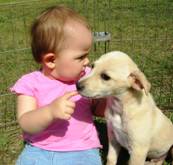Choosing the Right Dog
The problem with adopting a dog from an animal shelter? The selection of available canine companions can overwhelm you! Man's best friends come in all shapes, sizes, and—of course—personalities.
While almost any shelter dog can make a wonderful, lifelong companion for you and your family, some of those bundles of energy will make less appropriate pets for you than others.

The key is knowing what to look for. Here are a few things to think about:
Different Breeds and Mixes
How do you find out which dogs have the qualities you're looking for? Information is the key: learn about various breeds, visit with animals at the shelter, and speak with an adoption counselor for guidance.
Dogs fall into one of two categories: purebreds or mixed breeds. Most animal shelters have plenty of both. The only significant difference between the two is that purebreds, because their parents and other ancestors are all members of the same breed, are similar to a specific "breed standard." This means that if you adopt a purebred puppy, you have a good chance of knowing about how big he will get and what general physical and behavioral characteristics he will have.
Mixed Breeds
Of course, the size, appearance, and temperament of most mixed breed dogs can be predicted as well. After all, mixed breeds are simply combinations of different breeds. So if you know the ancestry of a particular mixed-breed puppy or can identify what type of dog he is (e.g., terrier mix), you have a good chance of knowing how he will turn out, too.
Mixed breeds offer several advantages over purebreds. When you adopt a mixed breed, you benefit from the combined traits of two or more breeds. You also get a dog who's likely to be free of genetic defects common to certain purebred dogs. Mixed breeds, in fact, are often considered the more "natural" dog. When you adopt a mixed breed, you adopt a unique companion.
Visit with Shelter Animals
While you are at the shelter, keep in mind that it is a stressful place for any animal. Quite often, a dog's true colors won't show until he is away from other animals and the shelter environment. So even if you walk past a kennel with a dog who isn't vying for your attention, don't count him out. He may just be a little scared or lonely.
An adoption counselor can help you select canines who will match your lifestyle. When you spend time with each animal, consider the following questions:
- How old is the dog? You may want to select a puppy as your new companion. However, young dogs usually require much more training and supervision than more mature dogs. If you lack the time or patience to housetrain your pup or to correct problems like chewing and jumping, an adult dog may be a better choice.
- How shy or assertive is the dog? Although an active, bouncy dog might catch your eye, a quieter or more reserved dog might be a better match if you don't have a particularly active lifestyle.
 How good is the animal with children? Learning about a dog's past through a history sheet or from an adoption counselor can be helpful, but past information isn't always available. In general, an active dog who likes to be touched and is not sensitive to handling and noise is a dog who will probably thrive in a house full of kids. Also keep in mind that puppies younger than four months of age, because of their fragility and special needs, often won't be adopted out to families with young children.
How good is the animal with children? Learning about a dog's past through a history sheet or from an adoption counselor can be helpful, but past information isn't always available. In general, an active dog who likes to be touched and is not sensitive to handling and noise is a dog who will probably thrive in a house full of kids. Also keep in mind that puppies younger than four months of age, because of their fragility and special needs, often won't be adopted out to families with young children.
What's Your Lifestyle?
Choosing the right dog generally means identifying the type of animal who matches your lifestyle and wants. If you live alone in a small, third-floor apartment, for instance, adopting a large, active retriever-mix might not be the best choice. Conversely, if you have a family of four and are looking for a companion to match your active lifestyle, such an animal may be perfect. A dog's size, exercise requirements, friendliness, assertiveness, and compatibility with children should all figure into your decision.